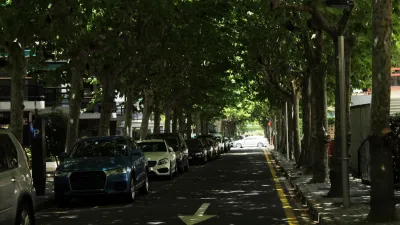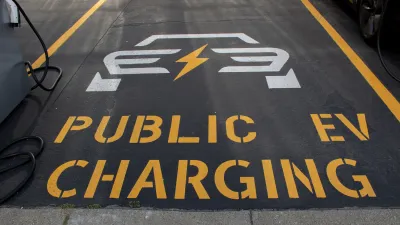New research assesses the potential implications of reduced car ownership on the design of roads and communities.

A new report from the Institute of Transportation Engineers analyzes how a decline in vehicle ownership could change the way planners design cities, reports Lori Aratani in The Washington Post.
The findings highlight the differing needs of people who choose to not own a car and people who are carless by necessity due to the high cost of car ownership or other barriers. “The report recognized that not having a car might not be a choice — some can’t afford to own and maintain a vehicle — which the study said underscores a need to adopt strategies to address such inequities.”
Civil engineer Douglas S. Halpert spoke with The Washington Post about the report, saying that “You’re already seeing changes in roadway design to accommodate additional modes other than personal vehicles, and there are more analysis metrics for operations other than delay and safety, which are becoming more generally accepted.”
According to the article, “The report’s authors want policymakers to consider whether transportation infrastructure funding is being invested in a balanced way that meets the needs of all travelers.” Halpert added that providing effective and attractive alternative transportation options is key to incentivizing people to reduce their car use.
FULL STORY: How a future with fewer cars may change how communities are designed

Planetizen Federal Action Tracker
A weekly monitor of how Trump’s orders and actions are impacting planners and planning in America.

Congressman Proposes Bill to Rename DC Metro “Trump Train”
The Make Autorail Great Again Act would withhold federal funding to the system until the Washington Metropolitan Area Transit Authority (WMATA), rebrands as the Washington Metropolitan Authority for Greater Access (WMAGA).

The Simple Legislative Tool Transforming Vacant Downtowns
In California, Michigan and Georgia, an easy win is bringing dollars — and delight — back to city centers.

The States Losing Rural Delivery Rooms at an Alarming Pace
In some states, as few as 9% of rural hospitals still deliver babies. As a result, rising pre-term births, no adequate pre-term care and harrowing close calls are a growing reality.

The Small South Asian Republic Going all in on EVs
Thanks to one simple policy change less than five years ago, 65% of new cars in this Himalayan country are now electric.

DC Backpedals on Bike Lane Protection, Swaps Barriers for Paint
Citing aesthetic concerns, the city is removing the concrete barriers and flexposts that once separated Arizona Avenue cyclists from motor vehicles.
Urban Design for Planners 1: Software Tools
This six-course series explores essential urban design concepts using open source software and equips planners with the tools they need to participate fully in the urban design process.
Planning for Universal Design
Learn the tools for implementing Universal Design in planning regulations.
Smith Gee Studio
City of Charlotte
City of Camden Redevelopment Agency
City of Astoria
Transportation Research & Education Center (TREC) at Portland State University
US High Speed Rail Association
City of Camden Redevelopment Agency
Municipality of Princeton (NJ)





























